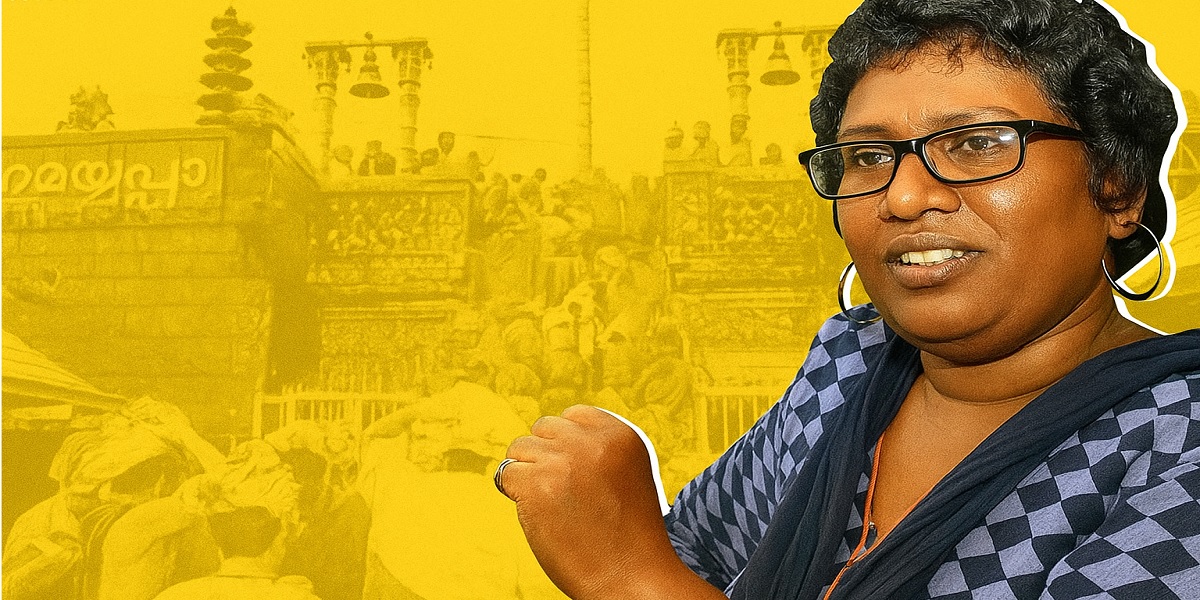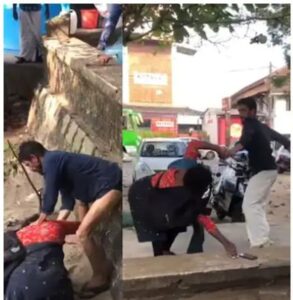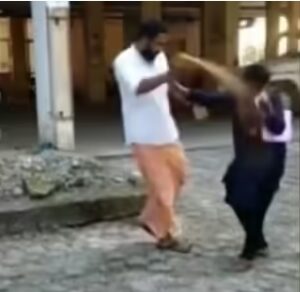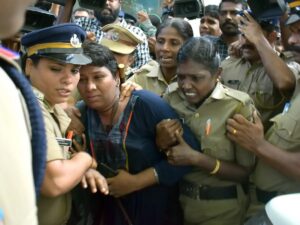Published Sep 02, 2025 | 7:19 PM ⚊ Updated Sep 26, 2025 | 11:24 AM

Once celebrated as a symbol of revolution and progressiveness, why is the Kerala state government now so confused about Bindu Ammini?
Synopsis: Dalit activist Bindu Ammini was much celebrated after she entered the Sabarimala Temple, backed by a Supreme Court order. Today, she lives in self-imposed exile, even as the ruling dispensation that once used her does not want her to attend a programme — even as a commoner.
New Year’s Day, 2019, dawned to an air of unease and anticipation in Kerala.
Some 15 days ago, CPI(M) leader and Chief Minister Pinarayi Vijayan had announced a women’s wall, covering the entire 620 kilometres from Kasaragod to Thiruvananthapuram, to be organised to protect the state’s Renaissance value.
The previous months have seen violent protests and six hartals — or shutdowns — ever since the 28 September Supreme Court allowed women of menstruating age, defined as those aged between 10 and 50, to visit the hill shrine of the celibate god, Ayyappa, in Sabarimala.
Women made attempts and were thwarted, often with muscle power, after the Supreme Court verdict in September 2018. The CPI(M) stood at the forefront to implement the court order, even as the Sangh Parivar cried foul and kept vigil against any woman daring to trek the hill from Pampa, Sabarimala’s base camp.
The issue split the society, especially women, into two. Women became classified as Kulasthree (traditional, religious women) and others, mostly progressive, both being taunted by those who supported and opposed the court verdict.
On 1 January 2019, the Vanitha Mathil — or the Women’s Wall — a human chain connecting the north and south of the state was successfully held.

An attack on Bindu Ammini at Kozhikode Beach.
Even as all eyes were on the human chain, two women and their supporters were closing in on Sabarimala. The police knew their plan. After nightfall, they trekked the hill with police escort. Early on 2 January, Dalit activist Bindu Ammini and a Brahmin Kanakadurga created history as the first women to enter the otherwise “out-of-bounds” temple after the Supreme Court verdict.
The media and a section of society celebrated their feat. They returned, oblivious of what was in store for them. The next day, the state went to yet another shutdown, the seventh in four months.
After multiple physical attacks, Ammini was forced to leave the state, and she now lives in Delhi. Kanakadurga’s family fell apart, and her husband divorced her. She remarried in July 2022.
Today, the Renaissance value, which Vijayan spoke about while announcing the Vanitha Mathil on 15 December 2018, seems to have lost its meaning for Ammini.
The Kerala government is now planning to organise a Global Ayyappa Sangamam — or conclave — on the sandbanks of Pampa on 20 September 2025. The government, headed by Vijayan, however, will not allow women in the 10 to 50 age group to attend the Sangamam.

Bindu Ammini being attacked with pepper spray.
Devaswom Minister VN Vasavan was more specific. Ammini would not be invited to the event.
Speaking to reporters, he said the Sangamam is meant for ”true devotees who regularly visit Sabarimala and representatives of pilgrimage-linked organisations.” Ammini did not fall under these categories, the minister categorically stated.
CPI(M) state secretary MV Govindan was more specific about women’s entry to Sabarimala. “It’s a closed chapter,” he said on Tuesday, 2 September.
Ammini, however, expressed her desire to attend the Sangamam and had written to the government requesting that it allow her to participate. Following the minister’s comments, she questioned whether the ban applied solely to her or also to political leaders such as the Kerala and Tamil Nadu chief ministers, whom she described as non-regular devotees.
The unfolding discussion poses a larger question: who qualifies as a ”true devotee”?
When South first spoke to Ammini, she spoke about Kerala’s ”progressiveness” that forced her to leave the home state and start life from zero elsewhere.

Kerala Devaswom Minister V. N Vasavan stated that Bindu Ammini would not be invited to the event.
“I believed in the assurances of the state. They told us we would be safe when we entered Sabarimala. The Travancore Devaswom Board (TDB) is a statutory body under the state government, and there is no ban on Sabarimala entry. The Supreme Court order has not been stayed.
She felt that keeping her away from the Global Ayyappa Sangamam is anti-democratic and unconstitutional. “My participation is my fundamental right, and I represent a historic movement for equality,” she said.
“Even without an official invitation, there should be space for me to participate. That’s why I wrote to the chief minister. I still hope for a positive response. I will consider further actions if the state continues to deny me recognition,” she added.
Ammini said she never regretted entering Sabarimala, but the state’s treatment meted out to her was cruel.
“Even with police protection, I faced attacks in the streets and bullying on social media. I broke no law, I violated no rules. I am not a devotee but a believer. I was forced to flee Kerala, not because of the devotees, but because of the politically motivated attacks, from both the LDF and UDF — not just the Sangh Parivar,” she further said.
Once celebrated by the ruling dispensation, Ammini is now tasting the bitterness of being used for political gains. “The current rulers have tried to erase me from every space. I was on the PSC list for legal assistant positions, but the list was cancelled. They are trying to nullify me financially,” she alleged.
“I am a first-generation Dalit woman, i.e, the first educated in my family. Kanakadurga had the protection of the Sangh Parivar, VHP and all. I faced everything alone. My fight is for equality, guaranteed by the Constitution. The conclave is happening in Pampa, where women are allowed entry. So, why this confusion over my participation?” she wondered.
Political activist Mini Mohan highlighted the sensitive timing of the upcoming conclave, coinciding with Kerala’s heated local body elections. She noted that there could be intelligence and vigilance reports on Ammini’s participation, as the state is aware that the BJP would strongly oppose any move to ensure her presence.
The Left government enforced the Supreme Court verdict on women’s entry as a symbol of ”progressiveness,” but it failed utterly to protect the safety and dignity of women. This failure has led to political and religious conflicts.
When women’s identities are exposed in such contentious matters, their lives become more vulnerable. Social change may happen slowly, but must women always pay the price? Today, many are almost invisible in Kerala’s social fabric.
Mohan recalled a personal incident. When she invited Ammini to the Kerala Literature Festival (KLF). Four officers from the Special Branch questioned her, asking why she had invited Ammini.
”The Left government used her for political ends, and now they are monitoring her,” she told South First.
Despite being highly educated and qualified, Ammini struggles to build a life in her own state. Financially nullifying a woman is tantamount to destroying her life. And with elections looming, the issue becomes even more politically and socially sensitive.
CPI(M) spokesperson Advocate A Anil Kumar told South First that the participation in the Global Ayyappa Sangamam is based on a registration process.
”How can we pick people who directly wrote to the chief minister regarding participation? Regarding women’s entry to Sabarimala, the RSS and Congress welcomed the Supreme Court verdict. The CPI(M) was aligned with it as well. But when we tried to enforce it, the same groups used it against us. Anyone can participate in the programme through proper registration channels,” he said.
On the other hand, Thrissur BJP chief N Nagesh described the sangamam as ”pure political drama”.
”Otherwise, CPI(M) would have to admit that this event is being conducted as an atonement to Ayyappa devotees and the Hindu community. We will oppose any move that damages the sanctity of Hindu beliefs and customs,” he warned.
(Edited by Majnu Babu).

